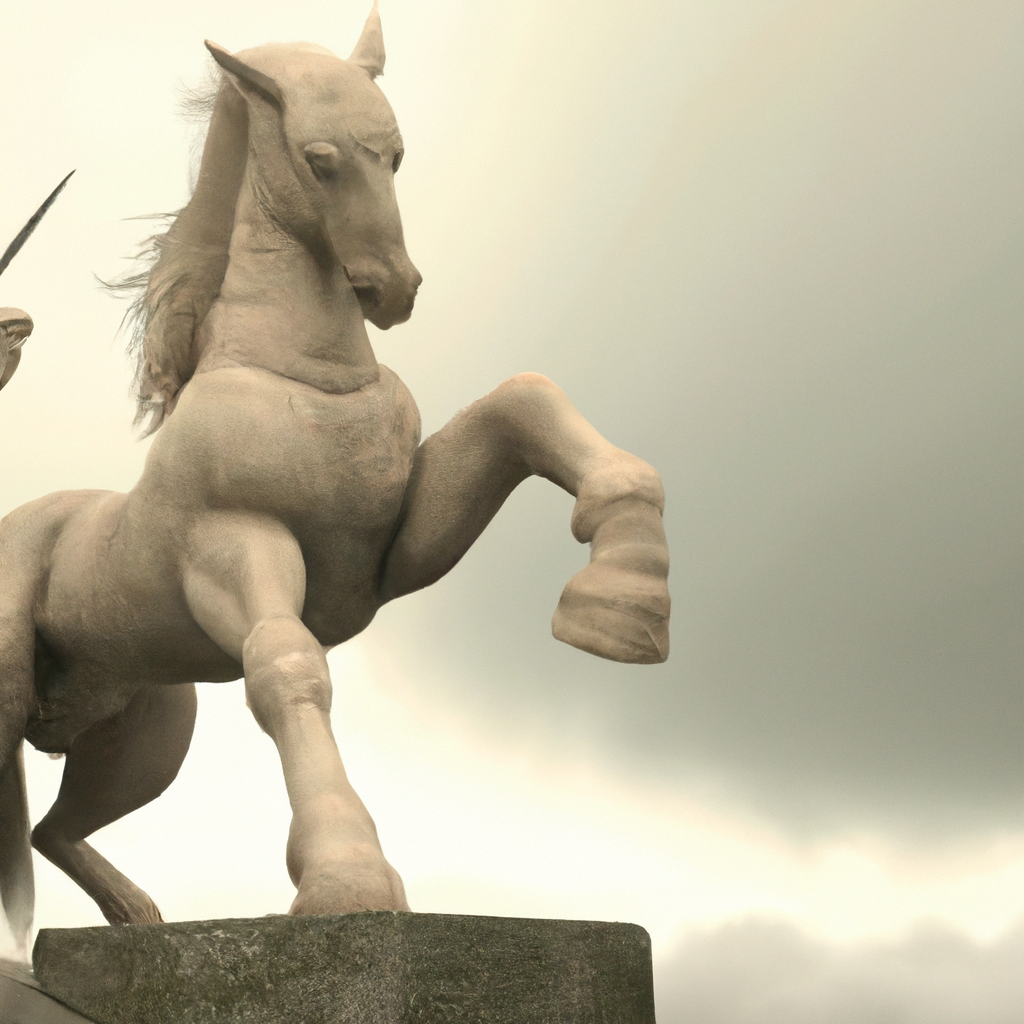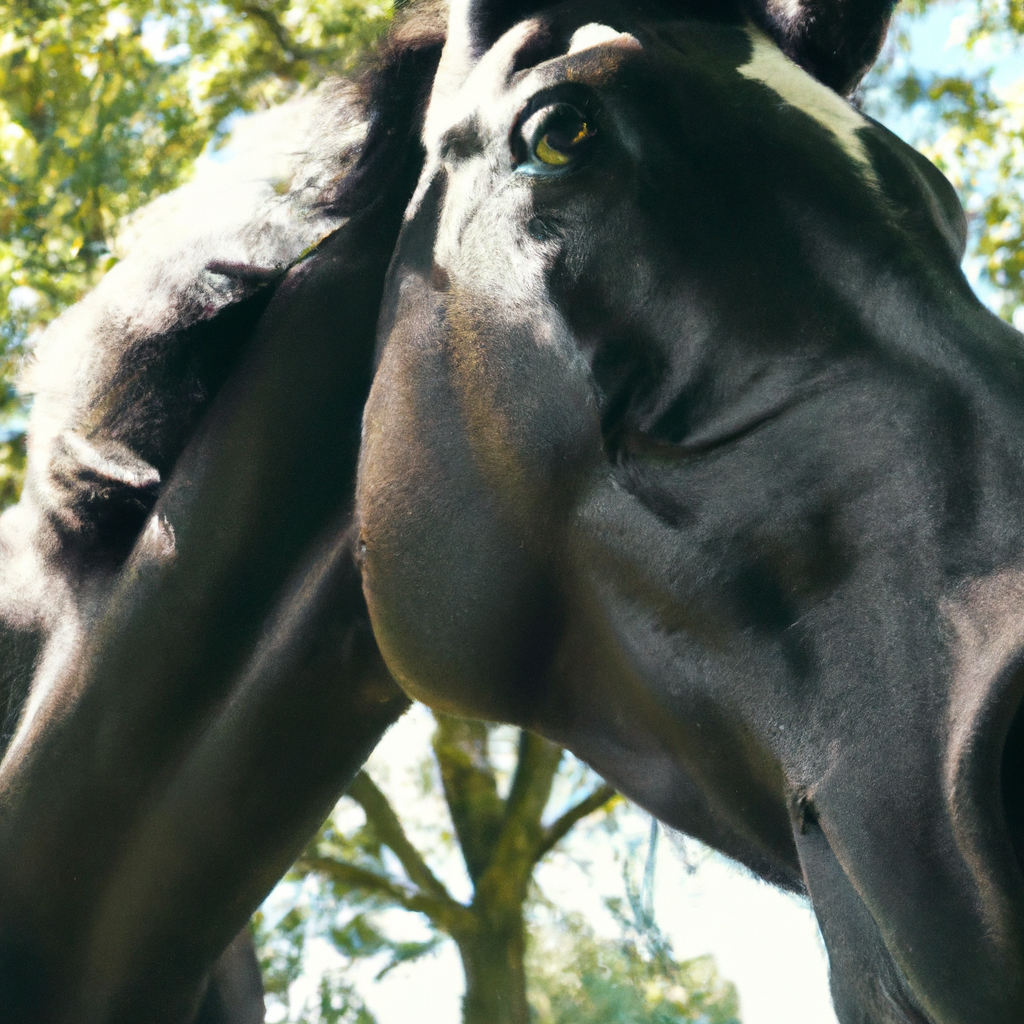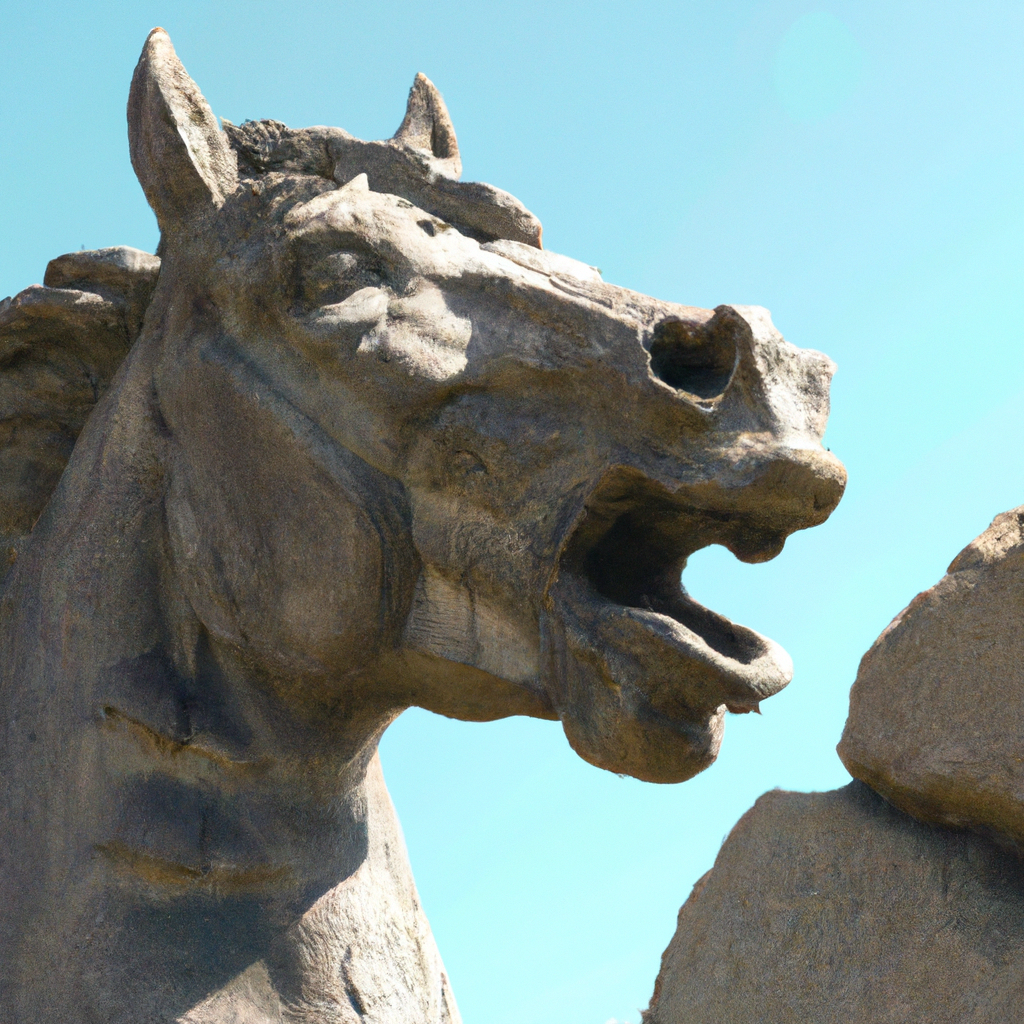-
Inhaltsverzeichnis:
- Einführung
- Why is Truth-Telling Important in Communication?
- What are the Consequences of Lying?
- What are the Benefits of Having a Fast Horse?
- What are the Different Breeds of Fast Horses?
- What are the Factors to Consider When Choosing a Fast Horse?
- What are the Best Practices in Training a Fast Horse?
- Fragen und Antworten
- Fazit
„Truth seekers need a swift horse.“
Einführung
„Whoever tells the truth needs a fast horse“ is an old proverb that emphasizes the importance of being truthful and the need for quick action to avoid negative consequences. It suggests that those who speak the truth may need to act quickly to avoid being caught in a lie or facing the consequences of their honesty. This proverb has been used in various contexts, from politics to personal relationships, to emphasize the importance of honesty and integrity.
Why is Truth-Telling Important in Communication?

In today’s world, communication is an essential part of our daily lives. We communicate with our family, friends, colleagues, and even strangers. However, communication is not just about speaking or writing; it’s also about being truthful. Truth-telling is an essential aspect of communication, and it’s crucial to understand why.
Firstly, truth-telling builds trust. When we communicate truthfully, we establish a sense of trust with the person we are communicating with. Trust is the foundation of any relationship, and without it, communication becomes difficult. When we lie or withhold information, we break the trust that we have built with the other person. This can lead to misunderstandings, conflicts, and even the breakdown of the relationship.
Secondly, truth-telling promotes transparency. When we communicate truthfully, we are open and transparent about our thoughts, feelings, and intentions. This helps to avoid any confusion or misinterpretation of our message. Transparency is essential in any communication, especially in professional settings. It helps to establish a clear understanding of expectations, goals, and objectives.
Thirdly, truth-telling fosters accountability. When we communicate truthfully, we take responsibility for our actions and words. We are accountable for the impact that our communication has on others. This helps to build a culture of accountability, where everyone takes responsibility for their actions and words. This is especially important in leadership positions, where leaders must be accountable for their decisions and actions.
Fourthly, truth-telling promotes authenticity. When we communicate truthfully, we are authentic and genuine. We are not pretending to be someone we are not, and we are not hiding behind a facade. Authenticity is essential in building relationships, as it helps to establish a sense of connection and understanding.
Finally, truth-telling promotes personal growth. When we communicate truthfully, we are honest with ourselves and others. This helps us to identify our strengths and weaknesses, and to work on improving ourselves. Personal growth is essential in any aspect of life, and truth-telling is a crucial part of that process.
In conclusion, truth-telling is an essential aspect of communication. It builds trust, promotes transparency, fosters accountability, promotes authenticity, and promotes personal growth. As the saying goes, „who tells the truth needs a fast horse.“ In other words, truth-telling is not always easy, but it’s necessary for effective communication and building strong relationships. So, the next time you communicate with someone, remember the importance of truth-telling, and strive to be honest and authentic in your communication.
What are the Consequences of Lying?
Lying is a common human behavior that has been around for centuries. It is a way of avoiding the truth or manipulating a situation to one’s advantage. However, lying can have serious consequences that can affect both the liar and those around them.
One of the most significant consequences of lying is the loss of trust. When someone lies, they break the trust that others have in them. This can be especially damaging in personal relationships, where trust is essential for a healthy and happy partnership. Once trust is broken, it can be challenging to regain, and the relationship may never be the same again.
Lying can also lead to feelings of guilt and shame. When someone lies, they know deep down that what they are doing is wrong. This can lead to feelings of guilt and shame, which can be difficult to shake off. These negative emotions can affect a person’s mental health and well-being, leading to anxiety and depression.
Another consequence of lying is the potential for legal trouble. If someone lies under oath or on a legal document, they can face serious legal consequences. This can include fines, jail time, and even a criminal record. Lying can also lead to the loss of a job or damage to one’s reputation, which can have long-lasting effects on a person’s life.
Lying can also have a negative impact on personal growth and development. When someone lies, they are not being honest with themselves or others. This can prevent them from learning from their mistakes and growing as a person. It can also prevent them from forming meaningful relationships with others, as trust is essential for any relationship to thrive.
In some cases, lying can even be dangerous. For example, if someone lies about their qualifications or experience, they may be putting themselves and others at risk. This can be especially true in professions such as medicine or engineering, where a lack of knowledge or experience can have serious consequences.
In conclusion, lying may seem like a quick and easy way to get what you want, but it can have serious consequences. It can lead to the loss of trust, feelings of guilt and shame, legal trouble, and even danger. It is essential to be honest with yourself and others, even if it is difficult or uncomfortable. As the old saying goes, „who tells the truth needs a fast horse.“ In other words, honesty is always the best policy.
What are the Benefits of Having a Fast Horse?
What are the Benefits of Having a Fast Horse?
Horses have been used for transportation, work, and sport for centuries. They have been bred for different purposes, and one of the most sought-after traits is speed. A fast horse can be a valuable asset for various reasons, and in this article, we will explore the benefits of having a fast horse.
Firstly, a fast horse can be a competitive advantage in horse racing. Horse racing is a popular sport that involves horses running at high speeds on a track. The fastest horse usually wins the race, and the prize money can be substantial. Owners of fast horses can earn a lot of money by entering their horses in races and winning. Moreover, a fast horse can also increase the value of a horse breeding business. Breeders who produce fast horses can charge higher prices for their services, and their horses can be in high demand.
Secondly, a fast horse can be useful for transportation. In the past, horses were the primary mode of transportation, and a fast horse could cover more ground in less time. Today, horses are still used for transportation in some parts of the world, such as rural areas. A fast horse can be a valuable asset for people who need to travel long distances quickly. For example, a messenger who needs to deliver an urgent message can use a fast horse to reach their destination faster.
Thirdly, a fast horse can be beneficial for hunting. In the past, horses were used for hunting, and a fast horse could help hunters catch up with their prey. Today, horses are still used for hunting in some parts of the world, such as in fox hunting. A fast horse can help hunters keep up with the hounds and catch the fox. Moreover, a fast horse can also be useful for chasing down cattle or other livestock.
Fourthly, a fast horse can be a valuable asset for the military. In the past, horses were used in warfare, and a fast horse could help soldiers move quickly on the battlefield. Today, horses are still used in some military operations, such as in search and rescue missions. A fast horse can help soldiers cover more ground in less time and reach their destination faster.
Lastly, a fast horse can be a source of pride and prestige for its owner. Owning a fast horse can be a status symbol, and it can be a source of pride for the owner. Moreover, a fast horse can also be a source of joy and entertainment for its owner. Riding a fast horse can be an exhilarating experience, and it can be a way to escape from the stresses of daily life.
In conclusion, a fast horse can be a valuable asset for various reasons. It can be a competitive advantage in horse racing, useful for transportation, beneficial for hunting, a valuable asset for the military, and a source of pride and prestige for its owner. However, owning a fast horse also comes with responsibilities. Owners must ensure that their horses are well-cared for and trained properly. A fast horse can be a powerful animal, and it requires a skilled rider to handle it. Therefore, if you are considering owning a fast horse, make sure that you are prepared for the responsibilities that come with it.
What are the Different Breeds of Fast Horses?
When it comes to horse racing, speed is everything. The faster the horse, the better the chances of winning. But not all horses are created equal when it comes to speed. There are certain breeds that are known for their speed and agility, making them the top choices for horse racing enthusiasts.
One of the most popular breeds of fast horses is the Thoroughbred. This breed is known for its speed and endurance, making it the perfect choice for horse racing. Thoroughbreds are tall and lean, with long legs and a muscular build. They are bred specifically for racing, and their bloodlines can be traced back for centuries.
Another breed of fast horses is the Quarter Horse. This breed is known for its speed over short distances, making it the perfect choice for sprint races. Quarter Horses are muscular and compact, with a low center of gravity that allows them to accelerate quickly. They are also known for their intelligence and trainability, making them a popular choice for rodeo events as well.
The Arabian horse is another breed that is known for its speed and endurance. This breed originated in the Middle East and was bred for long-distance travel across the desert. Arabian horses are known for their stamina and agility, making them a popular choice for endurance races. They are also known for their beauty, with a distinctive head shape and high-set tail.
The Standardbred is another breed of fast horses that is popular for harness racing. This breed is known for its speed and endurance, as well as its ability to maintain a consistent pace over long distances. Standardbreds are muscular and powerful, with a calm and docile temperament that makes them easy to train.
In addition to these breeds, there are many other types of fast horses that are popular for racing and other equestrian events. These include the Appaloosa, the Paint Horse, and the Tennessee Walking Horse, among others. Each breed has its own unique characteristics and strengths, making it important for riders and trainers to choose the right horse for their specific needs.
When it comes to horse racing, speed is everything. But it’s not just about the breed of the horse – it’s also about the training and care that goes into preparing the horse for competition. A well-trained and well-cared-for horse is more likely to perform at its best, giving it the edge it needs to win.
In conclusion, there are many different breeds of fast horses that are popular for racing and other equestrian events. Each breed has its own unique characteristics and strengths, making it important for riders and trainers to choose the right horse for their specific needs. Whether you’re a professional jockey or a casual rider, finding the right horse is key to success in the world of horse racing. As the old saying goes, „Whoever tells the truth needs a fast horse.“
What are the Factors to Consider When Choosing a Fast Horse?
When it comes to horse racing, speed is everything. A fast horse can make all the difference between winning and losing a race. But how do you choose a fast horse? What factors should you consider when making your selection?
First and foremost, you need to look at the horse’s breeding. A horse’s pedigree can tell you a lot about its potential for speed. Look for horses with a history of success in racing, particularly in the type of race you are interested in. For example, if you are looking for a horse to compete in sprint races, look for horses with a history of success in short-distance races.
Another important factor to consider is the horse’s physical attributes. Look for horses with long, lean legs and a deep chest. These physical characteristics are often associated with speed and endurance. Additionally, pay attention to the horse’s gait. A smooth, fluid gait is a good indication that the horse is comfortable and efficient in its movements, which can translate to speed on the track.
Of course, training and conditioning are also crucial factors in a horse’s speed. Look for horses that have been well-trained and conditioned for racing. This includes regular exercise, a healthy diet, and proper rest. A horse that is in good physical condition is more likely to perform well on the track.
Finally, it’s important to consider the jockey who will be riding the horse. A skilled jockey can make all the difference in a race, particularly when it comes to timing and strategy. Look for jockeys with a history of success in the type of race you are interested in, and consider their experience and skill level.
In addition to these factors, there are a few other things to keep in mind when choosing a fast horse. For example, consider the track conditions. Some horses perform better on certain types of tracks, such as dirt or turf. Additionally, pay attention to the horse’s temperament. A horse that is easily spooked or distracted may not perform well under the pressure of a race.
Ultimately, choosing a fast horse requires a combination of research, observation, and intuition. Look for horses with a strong pedigree, good physical attributes, and a history of success in racing. Pay attention to the horse’s training and conditioning, as well as the jockey who will be riding it. And don’t forget to consider the track conditions and the horse’s temperament. With a little bit of luck and a lot of careful consideration, you can find the perfect fast horse to take you to victory on the track.
What are the Best Practices in Training a Fast Horse?
When it comes to horse racing, speed is everything. A fast horse can make all the difference between winning and losing a race. But how do you train a horse to be fast? What are the best practices in training a fast horse?
First and foremost, it’s important to understand that not all horses are created equal. Some horses are naturally faster than others, and some are better suited for certain types of races. It’s important to choose the right horse for the job if you want to have a chance at winning.
Once you have the right horse, the next step is to focus on their physical training. This includes regular exercise, proper nutrition, and conditioning. A horse that is in good physical shape will be able to run faster and longer than one that is not.
In addition to physical training, it’s also important to focus on the horse’s mental training. Horses are intelligent animals, and they respond well to positive reinforcement and consistent training. It’s important to establish a good relationship with your horse and to work with them regularly to build their confidence and trust.
One of the best ways to train a fast horse is through interval training. This involves alternating periods of high-intensity exercise with periods of rest or low-intensity exercise. This type of training helps to build the horse’s endurance and speed, and it can be tailored to fit the specific needs of the horse and the type of race they will be running.
Another important aspect of training a fast horse is proper equipment. This includes the right type of saddle, bridle, and other gear that is designed to help the horse perform at their best. It’s important to work with a knowledgeable trainer or equipment specialist to ensure that your horse has the best possible gear for their needs.
Finally, it’s important to remember that training a fast horse takes time and patience. It’s not something that can be rushed or forced. It’s important to work with your horse consistently and to be patient as they learn and grow. With the right training and care, any horse can become a fast and successful racer.
In conclusion, training a fast horse requires a combination of physical and mental training, proper equipment, and patience. By focusing on these key areas, you can help your horse reach their full potential and achieve success on the racetrack. Remember, as the old saying goes, „who tells the truth needs a fast horse.“
Fragen und Antworten
1. What is the English translation of „Wer die Wahrheit sagt, braucht ein schnelles Pferd“?
The English translation of „Wer die Wahrheit sagt, braucht ein schnelles Pferd“ is „He who tells the truth needs a fast horse.“
2. What does the phrase „Wer die Wahrheit sagt, braucht ein schnelles Pferd“ mean?
The phrase „Wer die Wahrheit sagt, braucht ein schnelles Pferd“ means that telling the truth can sometimes have negative consequences, and it is important to be able to escape quickly.
3. Is „Wer die Wahrheit sagt, braucht ein schnelles Pferd“ a German proverb?
Yes, „Wer die Wahrheit sagt, braucht ein schnelles Pferd“ is a German proverb.
4. Who is credited with originating the phrase „Wer die Wahrheit sagt, braucht ein schnelles Pferd“?
The origin of the phrase „Wer die Wahrheit sagt, braucht ein schnelles Pferd“ is unknown.
5. What is the significance of a fast horse in the phrase „Wer die Wahrheit sagt, braucht ein schnelles Pferd“?
A fast horse is significant in the phrase „Wer die Wahrheit sagt, braucht ein schnelles Pferd“ because it represents the ability to escape quickly if telling the truth leads to danger.
6. Is „He who tells the truth needs a fast horse“ a common English expression?
No, „He who tells the truth needs a fast horse“ is not a common English expression.
Fazit
Conclusion: „He who tells the truth needs a fast horse“ is an old proverb that emphasizes the importance of being honest and quick to act. It suggests that those who speak the truth may face challenges and need to be prepared to face them quickly.








